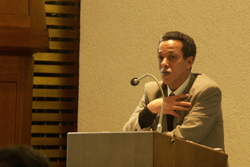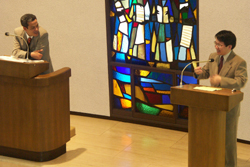Center for Interdisciplinary Study of Monotheistic Religions(CISMOR)Doshisha University
> Public Lectures > The Media and Religion: How Japanese media cover the Islamic worldPublic Lectures
Lecture (Open for the public)
The Media and Religion: How Japanese media cover the Islamic world
| Date: |
2005/03/12 |
|---|---|
| Place: | Chapel in the Divinity Hall, Imadegawa Campus, Doshisha Univ. |
| Lecture: | Dr. ElMostafa Rezrazi (Former producer at al-Jezeera) |
|
Dr. Rezrazi discussed Japanese perceptions of Islam in relation to the media. He emphasized that the Japanese interest in Muslims and the Islamic world ultimately grew after the last three wars in the Middle East, and has been closely related to the broadcast media. As for his introduction, Dr. Rezrazi mentioned the general influence on the public of the contemporary broadcast media. He explained 'regulation,' by which he meant that the media broadcast perspectives reflecting the values of their own staff and sponsors. He also referred to a recent survey of Japanese attitudes toward several countries in the Middle East. This survey showed that some of these countries, such as Iran, Morocco, Jordan, and Saudi Arabia, were not considered 'areas in which one prefers to live or to belong' by many Japanese. Dr. Rezrazi first explained how Japanese have named the religion of Islam. This reflects the historical background of Japanese perceptions. People used to use the Chinese name of Islam, Kai-kyo ('the tradition of Kai tribes'), and then changed to Mahomett-kyo ('Mohammedanism') reflecting European influence. Several processes and stages have led up to recent times, when people began to call the religion 'Islam,' a direct phonetic translation from the Arabic. Next Dr. Rezrazi described the Japanese media and their audience after the Gulf War. He noted that the Gulf War was the first time that the Japanese government was forced to engage its own decision-making in Middle Eastern affairs. At this time people realized that Japan ought to participate in world security. This time can also be regarded as the maturation of Middle Eastern Studies in Japan. Japanese universities began to establish courses and schools for Islamic Studies and Middle Eastern Area Studies, and many scholars in related fields were invited from abroad. Since the war in Afghanistan, Arabic-language media have proliferated and have influenced Japanese audiences. This is a consequence of the fact that Japanese broadcast stations began to cooperate with the Arabic broadcasting services and gained access to direct reporting from Iraq. Finally, Dr. Rezrazi described how, through the previous three wars in the region, Japanese have come to have a clearer view of the Middle East and to interpret Islam more neutrally than before. Asuka Nakamura (COE Research Instructor, CISMOR, Doshisha University) |
|
|
Handout |
|

